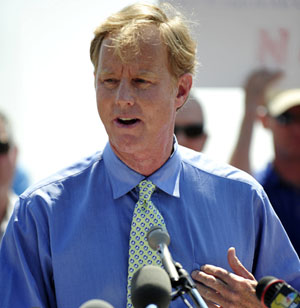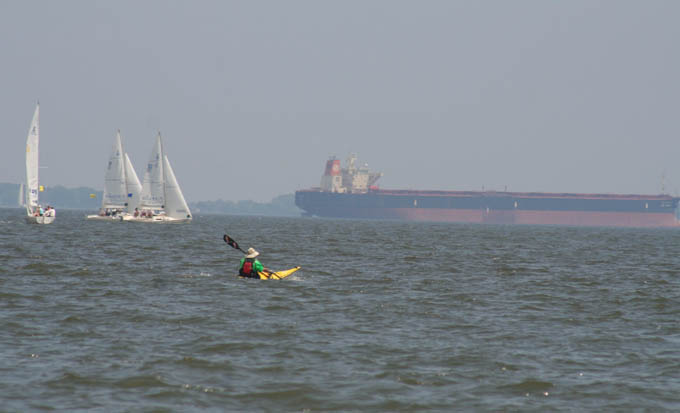Sharon Behn
News21 Staff

Chesapeake Bay Foundation President William C. Baker (News21 photo by Jason Lenhart)
ANNAPOLIS (June 17, 2010) -In the wake of the Gulf oil spill, scientists and environmentalists are questioning how ready the region is to respond to a disaster in the Chesapeake Bay.
“We don’t know of any detailed plans and response scenarios that are in place that have been practiced that are ready to go at a moment’s notice,” should a ship leak oil into the bay, William C. Baker, president of the Chesapeake Bay Foundation, told News21. “Clearly the states and the Coast Guard ought to do more planning.”
“There is no functioning [emergency response] system on the Bay in the terms of what we call operational,” said William C. Boicourt, an expert in physical oceanographic processes at the University of Maryland Center for Environmental Science at Horn Point. He said the center has been working on an early warning system for wind and oil patterns, but such a system is at least two years away.
Coast Guard Lt. Cmdr. Michael J. DaPonte said there are area contingency plans – collective efforts by federal, state and local agencies and industry representatives -- to respond to water-related disasters on the bay. But primary responsibility for cleaning any oil spill is the party responsible for the spill and the contractors it hires to do that work, DaPonte said.
He added the Coast Guard is not meant to stand by “like the fire department.” If there is an oil spill, the Coast Guard “does not jump to the response – it’s the responsible party that has to do that.”
But that kind of quick-fire response is exactly what is needed to handle an oil spill of any kind on the bay, Boicourt said.
Given the narrowness of the bay – it is six to 10 miles at some points – and its shallow bottom – 160 feet at the deepest point – an early warning system would be essential to saving fragile mashes and grasses that are vital to the already pollution-impaired waters, Boicourt said.
While there is no oil drilling on the Chesapeake, container ships and cruise ships carrying large fuel loads constantly traverse the bay, along with loosely supervised fuel-oil-carrying barges and tugs. If a ship or a barge were to hit the Bay Bridge and cause an oil spill – even one smaller than the British Petroleum accident in the Gulf -- “you could have a devastating effect” on the large but shallow estuary, Baker said.
The Coast Guard is required to hold area-level full-scale drills, where boom actually splashes water, every three years, said Lt. Kristen Preble, chief of the contingency preparedness branch within the Contingency Preparedness and Force Readiness Office at Hampton Roads. The contingency plans cover everything from oil spills to terrorist threats, she said.
The last full-scale drill the Coast Guard conducted in the upper Chesapeake’s watershed was three years ago, on the Potomac River, said Coast Guard Lt. Bryan A. Naranjo. That drill was on coping with a scenario of a barge spilling its load of fuel oil destined for delivery to Andrews Air Force base, he said.
A full-scale exercise scheduled for August was postponed until next spring because of the number of personnel and equipment being directed to the Gulf oil disaster, Naranjo said.
Shaun Adamec, a spokesman for Maryland Gov. Martin O’Malley, said full-scale first response exercises beyond scenario discussions would be an “unnecessary use of resources,” given that there are no major oil tankers or drilling in the bay, and because of the pressures created by the Gulf spill. He added that equipment exists to deal with oil spills.
The governor has directed his cabinet members who focus on bay issues to insure that the necessary equipment is properly maintained, Adamec said.
Jay Apperson, spokesman for the Maryland Department of the Environment, which Adamec said is charged with maintaining equipment, said it is “prepared and equipped to clean up oil spills.”
Apperson said MDE has conducted small water-related spill drills. One drill two years ago on the Susquehanna River and another last month on the Wicomico River were open-water drills.
Another involving the bay itself and another planned for this September off the coast of Delmarva are “table-top” exercises: “Basically people get their plans out and tell each other what they would do in the case of a spill,” Apperson said. “It helps make sure the information is up to date.”
Fred Millar, an emergency preparedness and homeland security expert, cautioned against the over-reliance on plans that local communities do not understand.
“Plans are plans. If they sit on a shelf and bear no relation to reality and are not communicated to the public, then that means they are useless,” said the former member of D.C.’s local emergency planning committee. “One way to make sure that plans are useful is to do drills very frequently, where you run a simulation in a full-scale drill.”
But drills cost money, and emergency services across the country are underfunded and under-resourced, he said. For the Coast Guard to hold a full-scale drill on the Chesapeake only every three years, Millar said, reflects how starved it was of resources and personnel.
Boicourt said quick-response teams need to be in place. “My sense is that if things were in place, then it would not necessarily be a disaster. But there are no quickly deployable” teams, he said.
And “when they talk about quickly deployable, that means not to just call up Baltimore, but have things distributed around the Bay and come out, like fire trucks.”
MDE’s Apperson said the department has trailers with more than 11,000 feet of boom, five spill response vessels and equipment deployed in different places throughout the state. It handles about 400 incidents a year on land and about 30 on water, he said.
Its seven-person emergency response team trains regularly, he said. “A few times a year, we train other people,” he said. “We are at an advanced level.”
In training, a hypothetical spill is designed, wind and tide are considered, and a boom is deployed, he said.
Dr. Beth McGee, a senior water quality scientist with the Chesapeake Bay Foundation, said the last large-scale oil spill in the bay region involved a pipeline break at Pepco’s Chalk Point power plant on the Patuxent River in April 2000 and involved roughly 150,000 gallons.
“For the Patuxent, it was a big spill,” said McGee, who at the time was working for the U.S. Fish and Wildlife Service, a leader in that clean-up effort. A significant amount of marshes and beaches in the Swanson Creek Marsh were oiled in the incident.
Local, state and federal services reacted promptly to the emergency, she said, but Pepco’s contractor in the incident failed to boom off a particular creek that had been identified as sensitive because its “boom was dry rotted and wouldn’t work,” McGee said.
Lawmakers, business leaders and environmental advocates have slammed BP for its inadequate plans as well as its slow and largely ineffective response to the oil cataclysm in the Gulf. BP’s Deepwater Horizon rig caught fire and sank off the coast of Louisiana on April 22, freeing hundreds of millions of gallons of oil into the Gulf of Mexico.
The Coast Guard has become the lead player in the federal government’s response to the Gulf spill, coordinating between BP and state and local officials.
According to the Center for Public Integrity, the U.S. government had conducted four major drills over the last eight years to prepare for such a massive oil spill – all of which “foreshadowed the weaknesses in coordination, communication, expertise, and technology that have plagued the federal response” to the BP disaster.
President Obama in March proposed opening up parts of the Virginia coast near the mouth of the bay to oil and gas drilling. Although action on that has been suspended pending an investigation into the Gulf incident, environmentalists and U.S. Sens. Benjamin L. Cardin and Barbara A. Mikulski (D-Md.) remain adamantly against any offshore drilling or exploration along the mid-Atlantic coast.
“The real solution is minimizing the amount of oil you handle on the water,” Baker said. “Whenever oil is handled on the water, it gets into the water in some quantity. That quantity is determined only by the level of human error and technical failure.”


